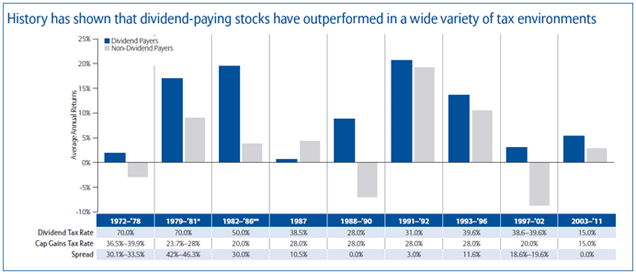Market Commentary - 5.30.12 Market Volatility, Dividend-Payers and Bush-Era Tax CutsMarket volatility has reared its ugly head. One hundred point swings in the Dow Jones Industrial Average are now commonplace. Tepid global growth, along with the daily deluge of bad news from Europe, has driven investor anxiety and, consequently, market volatility. In our opinion, one way to temper some of this volatility in portfolios is to include dividend-paying investments. Even with the Bush-era tax cuts set to expire at the end of this year, potentially pushing dividend tax rates much higher, analysis shows that even in a higher tax rate environment, dividend-paying companies have generally outperformed non-dividend-payers.
Adding dividend-paying investments to a portfolio provides a consistent income component that is received regardless of underlying price movements. Because these securities derive a portion of their total return from income rather than price appreciation alone, yield-generating investments may moderate portfolio volatility in an uneven market environment. Though dividend-paying investments offer solid benefits, the imminent expiration of the Bush-era tax cuts may make them less attractive. On a side note, there is still a possibility that these tax cuts will be extended given their potential impact on economic growth. Earlier this month, the bi-partisan Congressional Budget Office noted that the expiration of these tax cuts and automatic spending cuts on the Pentagon and domestic programs would shrink U.S. economic growth by 1.3% in the first half of next year. There is still much to debate on these issues, but even if taxes on dividends are raised, history has shown that dividend-payers outperform non-dividend-payers.
In the chart below from Ned Davis Research (and repurposed by many mutual fund companies), in different tax climates, dividend-payers outperformed non-dividend payers. Of course, other market related factors may have impacted performance. In the 1970s, the so-called "Nifty Fifty," which were generally the largest companies, were the strongest performers. These companies tended to pay dividends. In the early 2000s, the sell-off in high-beta companies (those with greater market sensitivity) affected dividend-paying companies less as most of them were lower beta. With that said, the most relevant time period to today is the post-recessionary 1993-1996 timeframe. In that period, dividend-payers outperformed their non-dividend-paying counterparts.

Source: Ned Davis Research, Allianz Global Investors
The recent spate of market volatility has unnerved clients. To help mitigate some market fluctuations in portfolios, we continue to suggest an increased allocation to income-producing investments, such as dividend-paying companies. While the Bush-era tax cuts could expire at the end of this year, sending tax rates higher on dividend payments, history has shown that higher dividend tax rates do not necessarily impede performance relative to non-dividend-payers. This information compiled by Cetera Financial Group is believed to be from reliable sources; however, we make no representation as to its completeness or accuracy. The information has been selected to objectively convey the key drivers and catalysts standing behind current market direction and sentiment. No independent analysis has been performed and the material should not be construed as investment advice. Investment decisions should not be based on this material since the information contained here is a singular news update, and prudent investment decisions require the analysis of a much broader collection of facts and context. All economic and performance information is historical and not indicative of future results. Investors cannot invest directly in indices. This is not an offer, recommendation or solicitation of an offer to buy or sell any security and investment in any security covered in this material may not be advisable or suitable. Please consult your financial professional for more information.
While diversification may help reduce volatility and risk, it does not guarantee future performance. Additional risks are associated with international investing, such as currency fluctuations, political and economic instability, and differences in accounting standards.
Multi-Financial Securities Corporation, its affiliates and subsidiaries and/or their officers and employees may from time to time acquire, hold or sell a position in the securities mentioned herein. |







